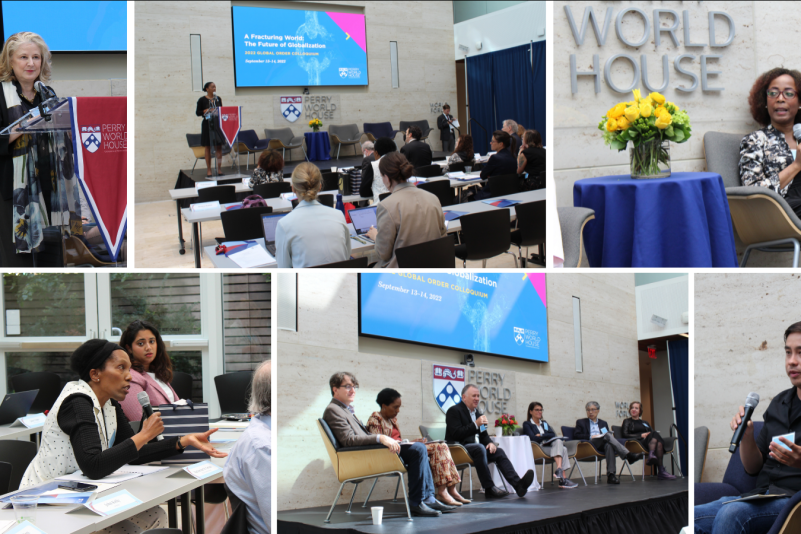Tuesday, September 13 - Wednesday, September 14, 2022 A Fracturing World: The Future of Globalization
Basic Page Sidebar Menu Perry World House
The 2022 Global Order Colloquium, “A Fracturing World: The Future of Globalization,” investigated important policy questions regarding the future of the globalized world, with a focus on supply chains, digital currencies, the future of labor, and the role of the internet in connecting the global economy.
Across two days in September, academics, policymakers, world leaders, and practitioners convened at Perry World House to address pressing questions related to the future of globalization. Participants explored a variety of issues guided by a singular question: Is the world deglobalizing? There was no consensus among the participants. Instead, there were competing visions of the future of the global economic and political orders.
While participants differed on what is to come, they were all clear that action needs to be taken to ensure economic resiliency across regions. Economic decoupling between the great powers, such as China and the United States, looks unlikely, but creating more resilient value chains will provide more opportunities for growth in emerging markets. This convening brought together individuals from across the globe to discuss strategies for creating a more resilient and equitable world order.

The colloquium opened with a panel discussing the future of the economic order, with a specific focus on supply chains and global value chains. The panelists generally agreed that economic decoupling was too costly to carry out for most countries, specifically the United States and China. Instead, they suggested adjustment: After setting a specific goal, a country could move parts of a value chain to more secure and resilient areas.
The colloquium then pivoted to a panel on the role of digital currencies—cryptocurrencies and Central Bank Digital Currencies (CBDCs)—in providing financial flexibility to emerging markets and to the unbanked. CBDCs provide unique opportunities for emerging markets and countries with less infrastructure since they allow citizens to carry state-backed money on their mobile devices. However, both CBDCs and cryptocurrencies have drawbacks, such as a lack of accessibility without the internet and few regulations. Panelists were divided on the positive and negative implications for different markets, but generally agreed that digital currencies are here to stay and will likely see more growth in the near future.
The next panel addressed how the COVID-19 pandemic affected the workforce and labor rights. The panelists agreed that the pandemic hurt migrant workers and their mobility, but struck a somewhat positive note about the future since workers and unions have demanded—and in some cases succeeded in attaining—broader protections and rights.
The final panel connected the previous three by discussing the exponential growth of the internet since 2020. It explored how internet accessibility and regular use have the potential to change lives for the better by providing new economic and social opportunities. Without the internet, just-in-time supply chains are not possible, and individuals cannot access their digital assets. In emerging markets in particular, internet access is life changing. However, a common thread in the panel was the dark side of the internet: Even in established democracies, it can be used for harmful purposes, such as censorship.
The first public event of the colloquium featured Malcolm Turnbull, the twenty-ninth prime minister of Australia, in conversation with Michael E. Mann, Presidential Distinguished Professor at the University of Pennsylvania. The two discussed how Australia was able to pass climate-focused policy initiatives in the face of rampant media disinformation and how voters can still use their power at the polls to enact change. The two called on the audience to act on climate change by voting for candidates who would push forward, rather than block, progressive climate policies around the world.
The second public program of the colloquium was a roundtable discussion between three ambassadors from the African Union, Singapore, and Uruguay, examining how the global economic order is changing. The three ambassadors—Hilda Suka-Mafudze, Ashok Kumar Mirpuri, and Andrés Durán—covered a breadth of issues affecting their countries and regions in a period of a fracturing economic order. Ambassador Suka-Mafudze highlighted how African Union member states are seeking to further integrate their countries, reducing political and economic barriers to cooperation. Each of the three ambassadors were positive about the possibilities that a globalized world could yet provide for their countries and people. They agreed that current shifts in the economic order could bring their countries, regions, and continents new opportunities for development—although they acknowledged the broader challenge of responding to growing geopolitical competition, particularly between the United States and China. They highlighted the importance of not being forced to pick a side.
Watch this conversation on our YouTube channel
Financial Times journalist Rana Foroohar joined Erika H. James, Dean of the Wharton School at the University of Pennsylvania, for a conversation about how countries are reacting to a changing world economy. Foroohar, author of Homecoming: The Path to Prosperity in a Post-Global World, argued that the prosperity promised in the 1990s by neoliberal economic reforms and the reduction of trade barriers did not reach all workers, with some becoming worse off. Foroohar challenged the fundamental benefits of this system. Touching on how the COVID-19 pandemic has exposed the weaknesses of global supply chains, she discussed how companies and governments are taking action to “friend shore” certain industries, especially those vital to national security. Foroohar mentioned how the former head of the American Federation of Labor and Congress of Industrial Organizations anticipated that positive economic effects of globalization for the American middle class would take at least a generation to be fully realized. She highlighted how recent disruptions to the global economic order have further delayed, or perhaps even altogether stopped, that progress.

